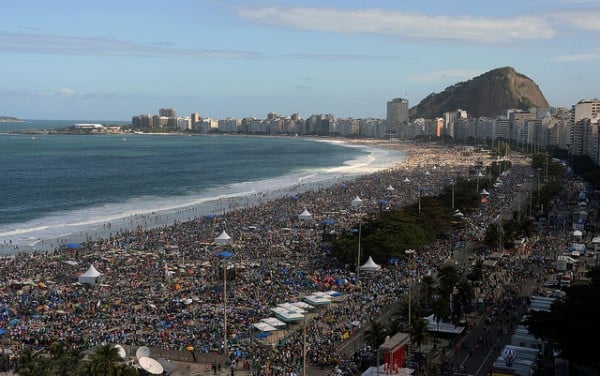
Hundreds of thousands of young Catholic pilgrims attending World Youth Day (WYD) start gathering at Copacabana beach in Rio de Janeiro for a prayer vigil with Pope Francis, on July 27, 2013. In a speech to Brazil’s political, religious and civil society leaders earlier, Pope Francis said a “constructive dialogue” was needed to confront the country’s social turmoil, referring to the massive street protests that rocked Brazil last month to demand an end to corruption and better public services. AFP PHOTO / VANDERLEI ALMEIDA
By Karina Junqueira de Almeida
Over the past week, several incidents have brought to light the vulnerabilities of Brazil’s security system. Pope Francis’s arrival showed the world the contrast between the heavily armed state military force that surrounded Palacio da Guanabara, the government’s administrative building where all authorities were waiting for the pope and its operational partners. The pope’s first ride from the airport was a security catastrophe, with the pope riding with his car window open in order to interact directly with people. Additionally, he was stuck in traffic because driver took the wrong turn, and he lost his convoy a few times as they tried to find a way to go, only to be chased and grabbed by a horde of passionate Brazilians with little to no guards around for protection. This blatant failure raised questions about Brazil’s security capacity.
As with all the mega-events that are coming to Brazil, this week’s security measures are a cooperative effort, with federal, state and municipal authorities acting together to assure the safety of the honored guest(s) and the public. Yet, within one hour of Pope Francis’s arrival, the capacity for cooperation proved grossly insufficient. Brazil has eight autonomous police organizations, all with different areas of expertise. At least four of those forces were responsible for the event’s security strategy. The municipal guards are responsible for traffic control and escort; federal police are responsible for the pope’s personal safety; the military protect against external threats and a variety of other functions. But the main actor in this week’s unfortunate security circus was Rio de Janeiro’s state military force and its poor leadership decisions. They are responsible for extensive policing and preservation of public order — in short, mob control, but at the time they were needed to organize the pope’s first contact with the public, there was no structure at all.
Scandal started long before Pope Francis arrived. In June, as several sectors of society came together to demand functioning educational and health systems among many other faulty services such as security. Since then, the flaws of the system have been clear as it is the reason of unwillingness to reform the systems. Brazil’s national public security system is the raw remains of a military dictatorship where maintenance of order took precedence over public safety and the strategy consisted in protecting itself from its own people.
At the time of constitutional reform in 1988, security reform was not a priority. While Brazilian society developed and the economy grew, the militarism remained institutionalized. These values started being criticized by human rights groups that work with poor communities because of the disproportionately violent treatment dispensed by the police forces towards mostly young, poor and black people. In order to maintain control, the police targeted socially disadvantaged people as if they were enemies of state, instead of humans and citizens worthy of respect.
Since the June protests, all three levels of government have been pressured by people that are instructed but tired and battered from politician’s neglectful care, to provide a reasonable response to their demands, at least they expected more than just words to address the masses. Consequently, social movements that received a positive response from the governments were easily persuaded to end demonstrations. But the opposite applies in Rio; the governor did not address the protests until a week later, and they were met with empty words of democracy reassurance. Hence, the pope’s visit presents an opportunity for demonstrators to expose the government and the outdated value system of the police, and these were met by the pope with pleas for the youth to stay strong and continue to fight corruption and to end inequality.
The signs were always there. The military police was always excessively aggressive and distant from the community. An enemy of the state culture has no place in a democratic Brazil. These protests, security and other fiascos from this past week demand a change in the system from Brazilian authorities. Nevertheless, the experience so far has shown that the status quo will resist change. The crowds and coming events from around the world will require security and civil control, and this far the only form of control Brazil’s state military forces have shown is violence or empty words.
Karina Junqueira de Almeida, a Brazilian attorney, is Master of Public Policy from the Hertie School of Governance in Berlin, Germany. Her blog, Demonstrations International Monitoring Platform tracks social movements in Brazil.